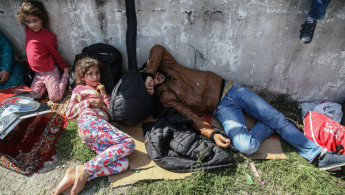EU "deflecting responsibility to protect refugees": HRW
The EU's response to the refugee crisis has largely focused on shifting responsibility onto countries outside the EU, said Human Rights Watch today.
EU interior ministers met on 14 September 2015 to reach agreement on the situation, but failed to agree on new concrete measures to share responsibility for refugees including a proposal for the mandatory distribution of asylum seekers or other steps to protect asylum seekers inside the EU.
Instead they focused on expedited returns and countering smuggling networks and aid to countries outside the EU.
"Faced with Europe's biggest refugee crisis since the collapse of Yugoslavia, EU governments can only agree to push responsibility to countries outside the Union," said Judith Sunderland, associate Europe and Central Asia director at HRW.
"The EU is supposed to have a Common European Asylum System, yet EU governments can't even agree on how to share responsibility for those in need of refuge," she added.
During their meeting interior ministers failed to agree to a mandatory distribution of asylum seekers among EU countries.
| Interior ministers failed to agree to a mandatory distribution of asylum seekers among EU countries. |
However, they did formally approve an already agreed voluntary scheme to relocate 40,000 asylum seekers from Italy and Greece over the next two years, although pledges remain short of that target said HRW.
Hotspots would also be created in Italy and Greece where individuals would be registered and fingerprinted, with the emphasis to prevent the onward movement of asylum seekers.
HRW said there are concerns asylum seekers could be subject to accelerated asylum adjudication procedures or be detained for months.
"These centres appear to be designed as both reception centres pending relocation and detention centres pending deportation," said said the human rights organisation.
"In principle the hotspots proposal could help manage the situation, but it all depends on the conditions, treatment, procedures in place, and on relocation commitments," Sunderland said.
"Otherwise detaining asylum seekers until an EU government agrees to take them could lead to mass prolonged detention," she added.
However, they postponed the decision to devise a concrete action plan concerning a recent European Commission proposal to relocate 120,000 asylum seekers from EU countries with a high number of arrivals.
Ministers also called for more support for UNHCR, the UN refugee agency, which is severely underfunded, for countries bordering Syria, and for other countries outside the EU including the Western Balkans to help improve conditions for Syrian refugees.
The aim is to provide “lasting prospects and adequate procedures for refugees and their families until return to their country of origin is possible.”



